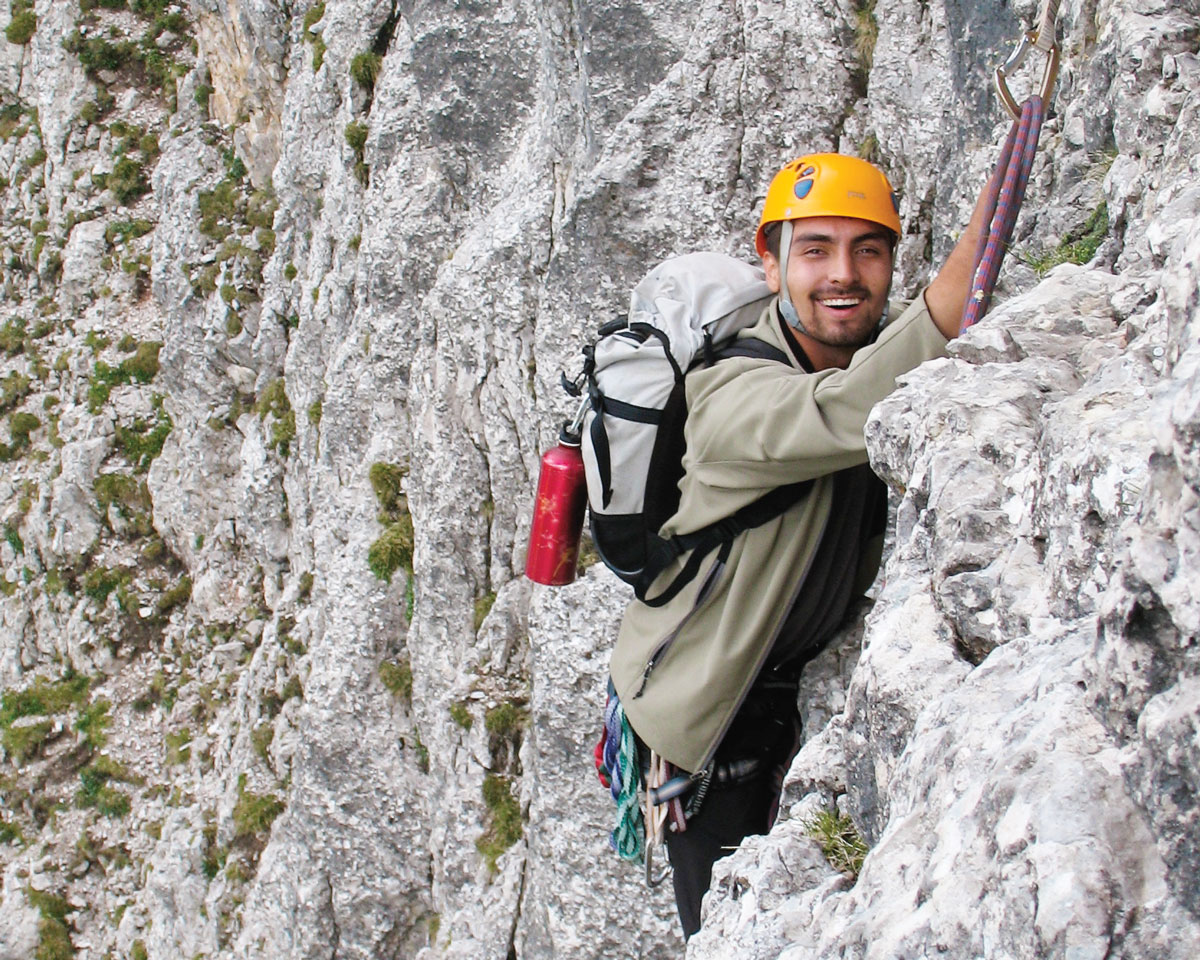Garon Coriz ’08

July 13, 2019, in the Sandia Mountains of New Mexico, from a rock-climbing accident.
Physician, activist, and rock climber Garon Coriz had recently moved back to the pueblo where he grew up to serve the community as a doctor. But a tragic climbing accident robbed him of the chance.
“We have lost the voice of a Native American who was compassionate, articulate, and a family physician who advocated for his patients, most of whom were disadvantaged,” said physician Kathie Allen.
Garon grew up in Albuquerque, New Mexico, and at Kewa Pueblo (formerly Santo Domingo Pueblo), and wrote about the trials of growing up a mixed-race child to a Native American mother and a white father. Children on the pueblo teased him, calling him “white buffalo,” while school children in Albuquerque “fabricated tales to get me in trouble; my word was tossed aside.”
When he lived with his mother, the love of pueblo family members helped protect him, and he credited his “brilliant Caucasian attorney for a father” for getting him through tough times in Albuquerque.
As a star basketball player at Albuquerque Academy, he was heckled. Later, when he was admitted into medical school, some people commented that was only because of affirmative action.
Garon quoted novelist and filmmaker Sherman Alexie, who said, “I used to think the world was broken down by tribes . . . black and white. By Indian and White. But I know this isn’t true. The world is only broken into two tribes: the people who are a**holes and the people who are not.”
Pueblo elders often reminded Garon, “Don’t forget about us, your people.”
“With the knowledge gained from many years of schooling, and wisdom earned navigating the tough, narrow line between the ‘native world’ and the ‘white world,’ I see ways to help my people,” Garon said.
At Reed, he majored in biology and wrote his thesis, “Formation of Filaments by H-NS and Ler,” with Prof. Jay Mellies [biology 1999–].
“Whether in academics or athletics, if Garon got knocked down, he would immediately get back up, never complained, and would just try that much harder,” Mellies recalled. “After graduating from Reed, and embarking on his career, he became an inspiration to many people, and to me. It quickly became apparent that Garon was teaching me a lot more than I had taught him. Garon made a difference in the lives of his patients, the members of his tribal community, those who championed causes, for example, Bears Ears National Monument, those he met while traveling, anyone who had the good fortune to intersect with his journey. Garon was a true ‘helper,’ and I am devastated that he is gone.”
Will Brown ’08, visiting assistant professor at Miami University in Oxford, Ohio, remembers playing basketball with Garon at Reed.
“Garon was a tremendous player—smart, fiercely competitive, and lethal at offense and defense, to the point that he pretty much dominated every team that crossed his path.” Will said. “His overwhelming talent and brash on-court persona made him feared and despised by our opponents. He was also a beloved teammate: loyal, encouraging, and funny as hell, with a loud cackle that erupted often during warm-ups and road trips.”
After graduating from medical school at the University of New Mexico, Garon finished his residency at the University of Utah Family Medicine Residency, where he was an outspoken advocate for those underrepresented in medicine. He mentored Native American students who shadowed him in the clinic and opened the eyes of coworkers with his holistic approach to medical care—making his ICU rounds with a local shaman healer. Garon was also a passionate advocate for rural patients addicted to opiates.
After his residency, he practiced in rural Salina, Utah, working for the North Sevier Medical Clinic with Intermountain Healthcare. He spent a summer in Ecuador and another in Peru, providing medical care to indigenous people in the Andes. He protested attempts to cut the size of Bears Ears National Monument in Utah and pushed to protect the land’s sacred uses to Native Americans, maintain public access, and restrict mining and fracking.
“That cause was foremost to him, partly because my grandparents were from that area and Garon learned to love southeast Utah,” his father, Scott Borg, said. “He did a lot of presentations on Bears Ears and other environmental issues.”
“Finding a balance between my tribal culture and the dominating world culture continues to be a bear I must wrestle daily,” Garon wrote. Having recently returned home, Garon was planning to work at a clinic on the pueblo.
Garon logged nearly 300 peaks in his summit log, including Grand Teton, South Sixshooter, Bears Ears, and Mount Rainier. He spent much of his time climbing steep towers and classic walls in the desert, but visited Alaska in 2017 and climbed Ham and Eggs on Mooses Tooth.
His father, acknowledging his own fear of heights, said he often feared his son might experience some catastrophe while climbing. “I’ve been trying to get him to stop climbing but he couldn’t be deterred. He’s been climbing since he was three years old. He loved it. He was doing the thing he loved when he died,” Borg said.
In addition to his father, Garon is survived by his mother, Nora Coriz, and a brother, Dion Coriz.
Appeared in Reed magazine: December 2019
comments powered by Disqus


![Photo of Prof. Marvin Levich [philosophy 1953–94]](https://www.reed.edu/reed-magazine/in-memoriam/assets/images/2022/LTL-levich1.jpg)
![Photo of President Paul E. Bragdon [1971–88]](https://www.reed.edu/reed-magazine/in-memoriam/assets/images/2020/Bragdon.jpg)
![Photo of Prof. Edward Barton Segel [history 1973–2011]](https://www.reed.edu/reed-magazine/in-memoriam/assets/images/2020/Segel.jpg)








































































